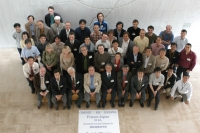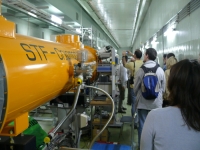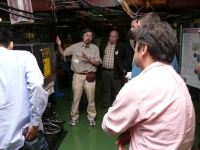 |
 |
|||||||||||||
|
|||||||||||||
|
|||||||||||||
|
The particle physics world has long been exchanging researchers internationally. One of the reasons for this active exchange is particle physicists share a common interest in the universal questions: How did the universe begin? What are the origins of mass? In addition, as the scale of accelerator facilities grows larger, it becomes difficult for each country to build and maintain their number of accelerators that are each suited for different purposes. This reality pushes researchers to travel abroad, wherever the accelerators are available.
After the signing of the “Agreement of Associated International Laboratory (AIL)” between the French and Japanese laboratories in May 2006, these international exchanges will be taken one step further. As a result of the new agreement, the France-Japan Particle Physics Laboratory (FJPPL), a joint laboratory between CNRS/IN2P3, CEA/DAPNIA, KEK and associated Japanese universities, held its first workshop at KEK on 9-12 May. About 90 participants including more than 30 French researchers presented a total of 23 joint activities that included ILC detectors and accelerator R&D, LHC physics, GRID computing, B and neutrinos physics, as well as cosmic ray experiments, bio-medical applications, and future plans. “Many French institutes are involved in the ILC Large Detector Concept, while many Japanese institutes are involved in another concept, the Global Large Detector,” said Kiyomoto Kawagoe of Kobe University. “We have many common features such as good energy resolution for jets and are both developing a good particle flow algorithm. It would be very good, if we, the French and Japanese groups, can work together on these common issues.” Jean-Eudes Augustin, LPNHE, Paris, concluded this meeting by stating, “FJPPL is a success.” He described the meeting as having ‘very distinguished participants’ that made a ‘high quality presentation’ and almost all projects demonstrated a lot of progress. “An excellent and efficient collaboration spirit from both the French and Japanese scientists have led this project to its great success,” he said. Particle physics continues to grow internationally by the day, making new collaborations like FJPPL useful for the future of the field. “The globalisation of science is expanding very quickly. It is clear that this international joint research has had excellent benefits to advance basic science,” said Fumihiko Takasaki, Director of the Institute of Particle and Nuclear Studies at KEK. “In industry, it has become a common move for companies to set their business base overseas and re-import the techniques or know-how from overseas subsidiaries. We should expand such efforts like FJPPL so that the science community can catch up with industry.” This workshop is the first in a series aiming to strengthen the cooperation between France and countries in Asia. The France-China Particle Physics Laboratory signed with the Sinica Academy of Science last month; the France-Korea Particle Physics Laboratory is in preparation, and the France-Vietnam Particle Physics Laboratory with Vietnam is currently under discussion. Other European countries are also expressing interest in participating in this programme. These developing international collaboration projects will be an important test model for large global endeavours like the ILC. -- Rika Takahashi Workshop Agenda |
|||||||||||||
| © International Linear Collider |


